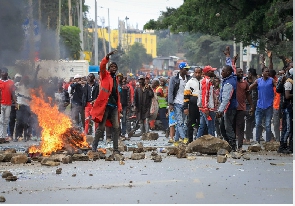The Kenyan High Court has blocked a new charge for national identity cards which had sparked a national outcry.
A petition by surgeon Magare Gikenyi argued that the government introduced the charges in a "capricious and arbitrary manner".
The petition said the charge meant ID cards were "out of reach of many ordinary citizens".
The cards had been free but a fee of 1,000 Kenyan shillings ($6; £5) was introduced without any advance notice.
The cost of replacing ID cards has also increased 20-fold to 2,000 shillings.
Kenyans are already struggling with a spiralling cost-of-living crisis, and the introduction, or increase in the cost of various other charges by the government, trying to increase its revenues.
Many Kenyans have complained about paying higher for government services that they believe are already funded by their taxes.
Earlier this year, the opposition led nationwide protests against a series of tax and prices hikes which led to at least 24 deaths.
The revised fees also affect other government-issued documents, such as passports, marriage certificates, work and residence permits and birth and death certificates.
Obtaining or replacing various categories of passports will increase by more than 50%, while the fees for obtaining birth and death certificates have increased by more than four times, reaching 200 shillings.
The government has also hiked the cost of acquiring citizenship or residence, including doubling the amount payable for children born to Kenyan citizens abroad to acquire permanent residence in Kenya to one million shillings.
The substantial and abrupt increases have raised concerns that they could create barriers for poorer Kenyans to access government services or participate in processes that require government documents, such as voting and marriage.
"Jokes aside, paying for an ID excludes a group of people from voter registration hence a huge hindrance to the realization of the right to vote," one Kenyan said on the social platform X.
According to the World Bank, 27% of Kenyans live under the poverty line, spending less than $2.15 a day.
Some politicians have also criticised the price hikes, while some government officials have disputed them.
Roseline Njogu, who heads the department of diaspora affairs, said the price hike in the permanent residence fees for children of Kenyan citizens born abroad "were entered in error" and will be rectified.
Since coming to power in September last year, President Ruto's government has increased taxes on necessities like fuel, as well as charges on several services offered by the government, such as entry to national parks.
Last week, the revenue authorities introduced a new directive to tax personal or household items worth $500 (£400) and above from visiting tourists and citizens returning to the country - another measure widely condemned.
President Ruto has not commented on the increases, but in his first state of the nation address on Thursday, he said that the government has had to make choices that were "not easy but necessary" to save Kenya from what he described as an unsustainable debt burden.
Africa News of Thursday, 9 November 2023
Source: bbc.com

















